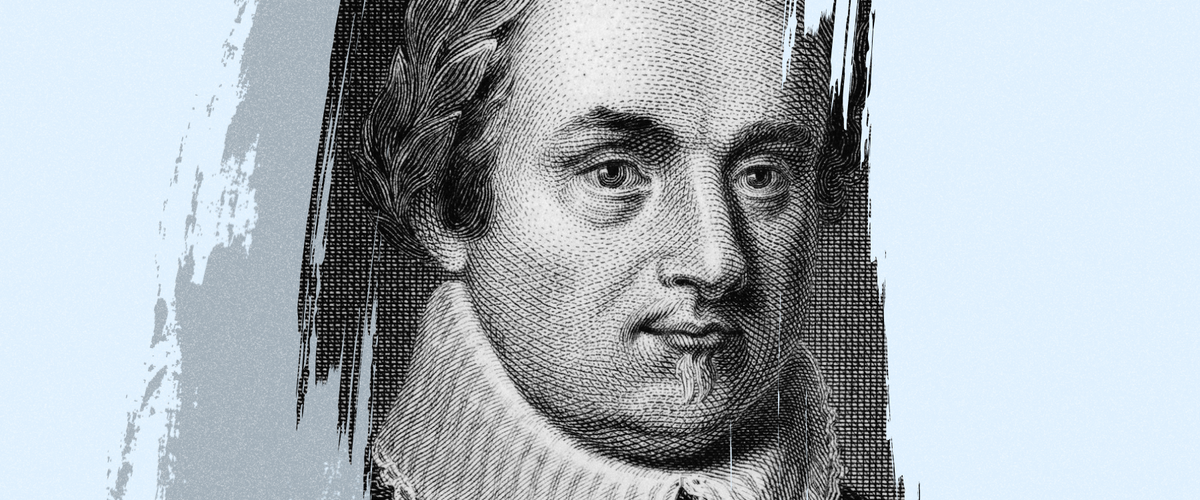Fine Knacks, Painted Things: John Dowland and Michael Drayton
By Robert Pinsky
The history of poetry is tied up with the history of courtship, and the history of courtship is tied up with the history of courts as a setting for elegant flirtation and elegant language.
Display, in particular male strutting, with verbal wit as the peacock’s tail, is part of that tangle in the first great period of English poetry. From the beginning there seems to be a reaction or counter-tradition, emphasizing plainness and sincerity as superior qualities in a lover — and in love poetry.
Even the stylish, glossy boasting of Michael Drayton, in Sonnet 6 from his sequence Idea embodies that appeal to plain speech and candor: I smile a little, every time at “that now in coaches trouble every street” in his second line. Along with his quick-footed, somewhat foppish capering for the lady, he successfully speaks in the role of a blunt, even rude speaker, not mincing words: “paltry, foolish, painted things.”
The musician John Dowland may have written the words for his own songs. Dowland’s cunning madrigal has its game at least two ways: the poet engages in a more elaborate role-playing than Drayton’s and makes a more extreme, emphatic claim on plainness and sincerity. Presented as the cry of a street-merchant, the poem is an ornate claim to plainness. For instance, the line “Of others take a sheaf, of me a grain,” enforces its boast about concentrated value with a pun on “sheaf,” which can mean a bundle of stalks (as in wheat) or a bundle of papers (as in poetry). The line “It is a precious jewel to be plain” both embodies what it says and represents, in context, footwork so fancy it makes Dowland look straightforward.
In their complicated way, Dowland’s “knacks” (do people still have knick-knack shelves?) make a larger, grander claim than Drayton’s “immortal song.”
The song, with Dowland’s engaging tune, can be heard on YouTube performed by the counter-tenor Alfred Deller and by Sting.
HOW MANY PALTRY, FOOLISH, PAINTED THINGS
(Michael Drayton, 1563-1631)
How many paltry foolish painted things,
That now in coaches trouble every street,
Shall be forgotten, whom no poet sings,
Ere they be well wrapped in their winding-sheet!
Where I to thee eternity shall give,
When nothing else remaineth of these days,
And queens hereafter shall be glad to live
Upon the alms of thy superfluous praise.
Virgins and matrons, reading these my rhymes,
Shall be so much delighted with thy story
That they shall grieve they lived not in these times,
To have seen thee, their sex’s only glory:
So shalt thou fly above the vulgar throng,
Still to survive in my immortal song.
FINE KNACKS FOR LADIES
(John Dowland, 1563-1626)
Fine knacks for ladies, cheap, choice, brave and new!
Good pennyworths! but money cannot move.
I keep a fair but for the fair to view.
A beggar may be liberal of love,
Though all my wares be trash, the heart is true.
Great gifts are guiles and look for gifts again;
My trifles come as treasures from the mind.
It is a precious jewel to be plain;
Sometimes in shell the Orient’s pearls we find.
Of others take a sheaf, of me a grain.
Within this pack pins points laces and gloves,
And diverse toys fitting a country fair.
But in my heart, where duty serves and loves,
Turtles and twins, court’s brood, a heavenly pair.
Happy the heart that thinks of no removes!
Originally published in the Robert Pinsky Poetry Forum, March 26, 2014.
